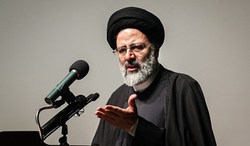 Iran's new Judiciary Chief Seyed Ebrahim Rayeesi underlined his serious fight against the elements threatening security in the country and those who violate the law.
Iran's new Judiciary Chief Seyed Ebrahim Rayeesi underlined his serious fight against the elements threatening security in the country and those who violate the law. RNA - "No one under any condition and in any position is entitled to bypass and violate the law," Rayeesi said, addressing an inauguration ceremony to introduce him as the new judiciary chief in Tehran.
He also underscored the importance of security, saying that Iran is one of the most secure countries in the world but different threats yet exist.
"We will not at all compromise or ignore violations and organized crimes and any distortion of the country's security," he said.
Elsewhere, Rayeesi described the Islamic laws as a source of happiness for human beings, and said the countries and organizations which only claim to be advocates of human rights are actually suspects with "a long list of violations of human rights is in their records".
Supreme Leader of the Islamic Revolution Ayatollah Seyed Ali Khamenei in a decree issued on Thursday named Rayeesi as the new head of Iran's Judiciary.
Rayeesi, a renowned figure in Iranian politics who is the Chief Custodian of Astan Quds Razavi - that runs assets and affairs related to the shrine of Shiite Islam's 8th Imam, Hazrat Ali Ibn-e Mussa (AS) - is a former deputy judiciary chief and replaces Sadeq Amoli Larijani who ran the country's judicial power for two five-year terms and was recently appointed by the Leader as the chair of the highly positioned Expediency Council. Rayeesi is also a member of the same council.
In his decree, Ayatollah Khamenei praised Rayeesi's knowledge of jurisprudence, experience, healthy character, trustworthiness and efficiency, and stressed the necessity for change and a more powerful and resolute judiciary during his term, given the long record of Rayeesi in different judicial posts and his full knowledge of the different dimensions of Iran's judicial structure.
Ebrahim Rayeesi was born to a religious family in the holy city of Mashhad in December 1960 and lost his father at the age of 5. He studied in Mashhad seminary, Navvab school and Qom seminary. He has studied religious lessons under the supervision of several prominent clerics, including Martyr Ayatollah Beheshti, Martyr Ayatollah Motahhari and Grand Ayatollah Nouri Hamedani.
He has also studied law at Shahid Motahhari school and received PhD in jurisprudence and private law. His academic record also including teaching at Imam Sadeq, Shahid Motahhari and Islamic Azad Universities as well as seminary schools in Mashhad and Tehran.
Rayeesi has authored four books on religion and law and has 3 other books under publication.
In 1981, he was appointed the prosecutor of Karaj and then served in different posts, including the prosecutor of Hamedan province, Tehran's deputy prosecutor, Tehran prosecutor, Head of the General Inspection Organization of Iran (GIO), Judiciary top deputy chief, Iran's chief prosecutor, chief prosecutor of clerics court, custodian and chairman of Astan Quds Razavi, representative of South Khorassan province in the Assembly of Experts, member of the high council of cyberspace and member of the headquarters to fight against economic corruption.
He has also been a notable participant in a range of social activities before and after the 1979 Islamic Revolution, including the clerics' struggle against the former Pahlavi regime in Iran, representative of late Imam Khomeini in Lorestan, Kermanshah and Semnan provinces, establishment of Fatemeh Zahra seminary in Tehran and specialized center to study Shiism and delivery of speeches and essay presentation in different international conferences in several world states.
On 6 April 2017, Rayeesii announced his official nomination for the 2017 presidential election. He registered on 14 April and was ranked first in the voting of the Popular Front of Islamic Revolution Forces for presidential candidate. He lost the election to incumbent President Hassan Rouhani after garnering almost 16 million votes.
847/940